Meetings are an important tool in any business, but they can often go awry. With poorly defined agendas, individuals speaking up for self-validation and poor leadership, catch-ups can easily overrun, breaking up the flow of the day and reducing productivity. Poorly planned meetings can cause more harm than good.
So how can you improve meeting outcomes and what is the best way to get the most out of your team? We’ve done a deep dive into the psychological research surrounding well-being
Foster a Positive Culture
Does a high-pressure environment improve outcomes? It’s a common misconception that high-pressure work environments cause better performance in employees through driving financial success. While this might be the case in the short term (indeed a high-pressure environment does superficially drive performance), over time, consistently high stress in the workplace is associated with increased disengagement, decreased loyalty, more time off and more workplace accidents. So, when you’re engaging with your colleagues during a huddle, here’s what you can do to help improve your meeting outcomes over time. Bear in mind that this isn’t a quick fix—it takes time to generate a positive office culture, but once you have it in place, the rewards are more than worth it.
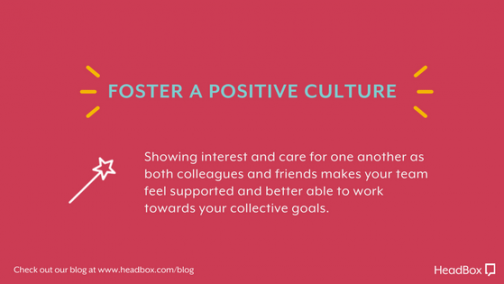
Supporting one another and extending kindness and compassion through treating colleagues as friends can be hugely beneficial for workplace well-being. During meetings, avoiding blame is crucial—take a solutions-oriented approach and forgive mistakes. This positive framing unites the team with a common goal and avoids any feelings of resentment.
Ensuring that the reason for a meeting is clearly defined is key: outlining and emphasizing the meaningfulness of the work can dramatically increase mental investment in a project among team members. In The Social Psychology of Organizations, Katz and Kahn attribute high internalization of company goals to lower absence and increased productivity and innovativeness in addressing those goals.
Advocate Lone Working (Individual Brainstorming)
Does teamwork really make the dream work? Research by Nicholas Kohn in 2010 (“Collaborative fixation: Effects of others’ ideas on brainstorming,” Applied Cognitive Psychology), found that brainstorming may not always be the best way to generate new ideas. The act of ideation in groups can actually constrain ideas down a limited channel through unconscious fixation to a particular idea. Essentially, we tend to mimic those who we’re brainstorming with, unintentionally narrowing the potential innovativeness of our ideas.
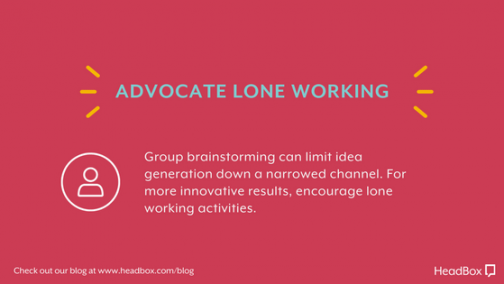
If you’re looking to host a creative meeting, try to mix up idea-generation activities, offering lone and group opportunities for idea generation to increase the scope of ideas.
Change Meeting Rooms
When scheduling meetings, we often work around time slots, selecting spaces based on when everyone is available, without much consideration as to how a meeting will affect productivity throughout the rest of the day. Scheduling is important. Choosing a slot that will cause minimal disruption to the work day will increase engagement during the meeting, resulting in an all-round more efficient day for all.
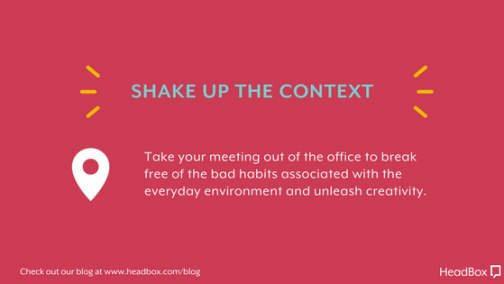
Changing up the location of a meeting can have a positive effect on meeting outcomes. Taking your meeting to an inspiring setting can increase curiosity and unleash creativity through breaking potentially bad habits. If your team is used to having meetings in the same spot each week, bad habits can become associated with that meeting space. Shaking up the location frees the team from those bad habits. We tend to associate environments with how they make us feel. If our experience within a space is associated with feeling lethargic, our mood is likely to be altered in line with that state. Breaking away from those habitual behaviors can open us up to new ideas and increase innovation.
If you’re taking a meeting out of the office then it’s a good excuse to make your meeting more of an event with scheduled breaks where delegates can socialize. This is turn could benefit productivity through making your delegates feel valued and rewarded for their hard work.
Plan with Your Goals in Mind
When it comes to planning a meeting, it’s crucial to keep your goals in mind. A strong agenda is, of course, key and it’s important to ensure this is shared with the team well in advance. Go over your agenda at the start of the meeting so that your aims are clearly outlined and everyone is on the same page. Once you have a strong agenda in place, make sure you stick to it. Time activities to crystalize ideas but maintain the flexibility to extend discussions if they are proving particularly fruitful.
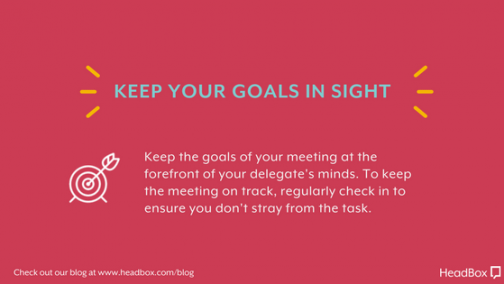
Whilst the content of your meeting is important, delivery is pivotal to you achieving your goals. Ensuring that the leader of the meeting is inspiring to delegates will increase motivation. Research has shown that expert leaders inspire lively debate and diversity of opinions.
To Sit or Not to Sit?
A study by Bluedorn and colleagues (“The effects of stand-up and sit-down meeting formats on meeting outcomes,” Journal of Applied Psychology) showed that sit-down meetings were around 35% longer than stand-up meetings but showed no difference in the decisions generated. Losing the table and chairs keeps your delegates on their toes and reduces the opportunity for disengagement. The benefits? Less time spent in meetings with no reduction on the quality of ideas output!
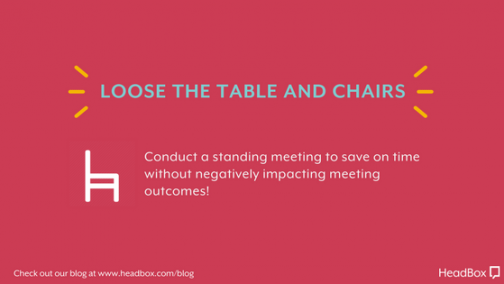
Four tenets of Effective Meetings
Research by Charan (“Conquering a Culture of Indecision,” Harvard Business Review) outlines four main tenets of an effective meeting—that they are open, candid, informal and marked by closure.
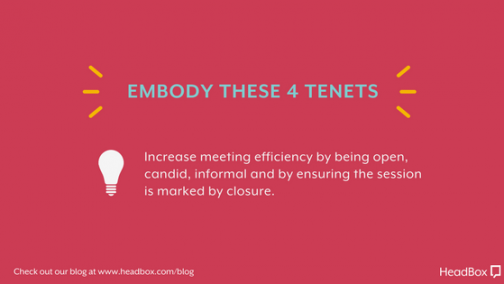
Open
As we have covered, defining the goals of a meeting is important, however ensuring that the outcomes are not predetermined will keep delegates open to new ideas. Open-ended questions such as “where can we go from here?” promote a readiness to hear new perspectives where alternative opinions are valued.
Candid
Creating a meeting environment where delegates feel able to express ideas that are not in line with the norm prevents the need to revisit decisions and increases the level of innovation within the meeting context. During group scenarios, individuals will often withhold their opinion if they feel it goes against the thoughts of the group. Placing an emphasis on idea equality (the notion that no idea is off-limits) will allow your team to feel comfortable expressing their thoughts without fear of rebuke.
Informal
Setting up an informal environment promotes honesty and decreases defensiveness. When we feel comfortable in an environment we will respond in a more open way and will feel less constrained by a formal setting, allowing ideas to flow freely.
Marked by Closure
Just as outlining the goals of the meeting is important, so, too, is closure. At the end of the meeting, delegates should be clear on exactly what the next steps should be, what points they need to act on and how they intend to do so. Closure to a meeting assigns accountability to the individual where they are motivated to follow through on their intentions.
As a young company here at Headbox, we know how important it is to maximize meeting outcomes. A time-poor startup ourselves, we have used the above research to inform our meeting strategy and have found these key points to be hugely beneficial. We’re a small team and we’re constantly around the same people and the same meeting rooms. That’s why we’re keen to keep things fresh and interesting to make sure that we are constantly pushing ourselves to be innovative in our approaches.
Take a look below at a handy downloadable graphic for you to keep close at hand to reference when you’re next hosting a meeting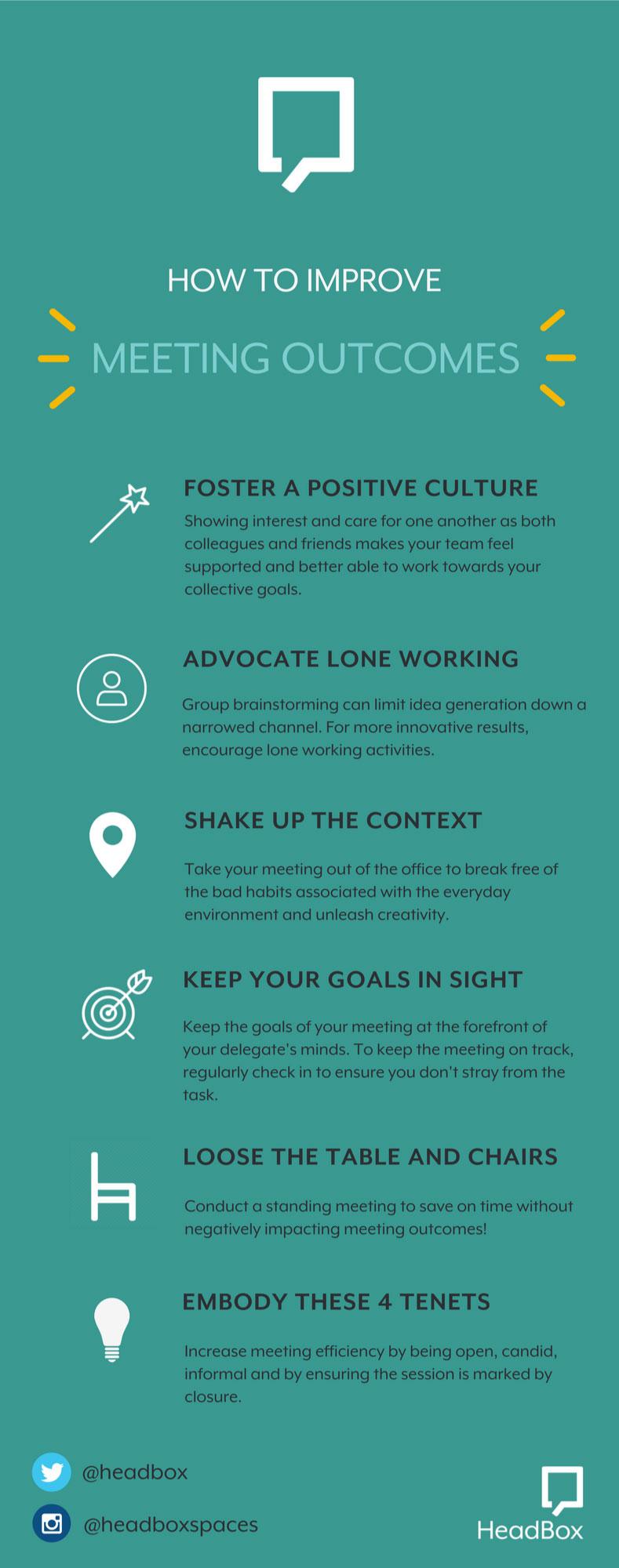
This article was originally published on our affiliate site PlanYourMeetings.com.

